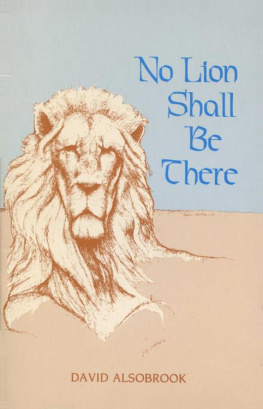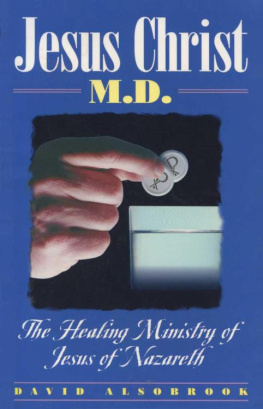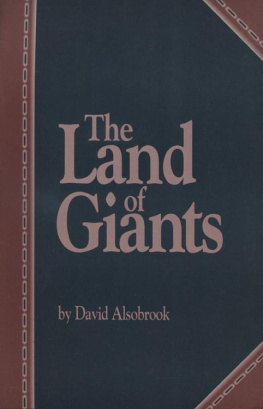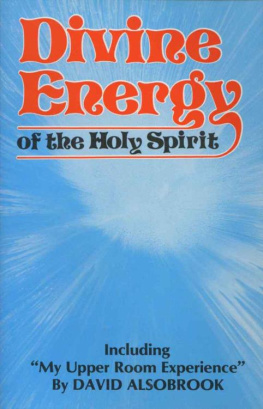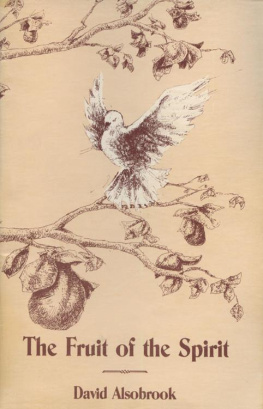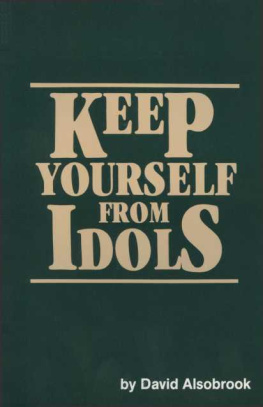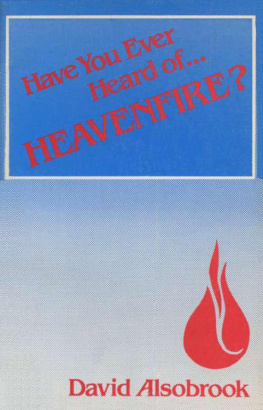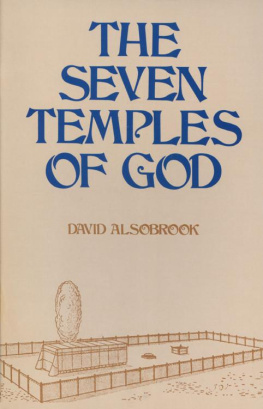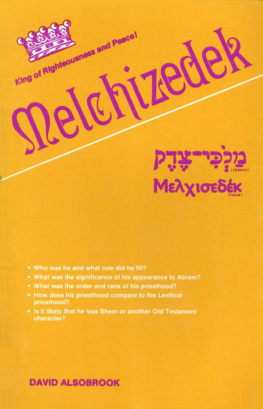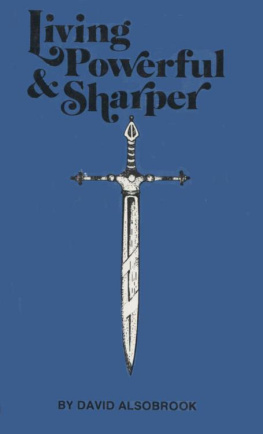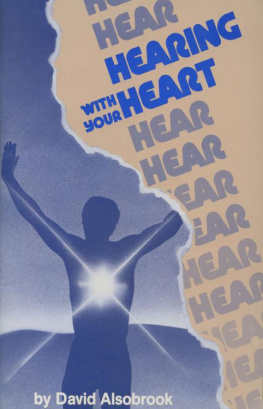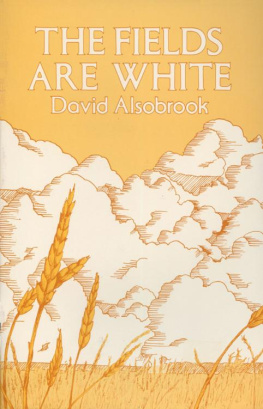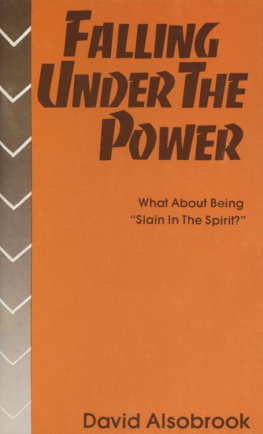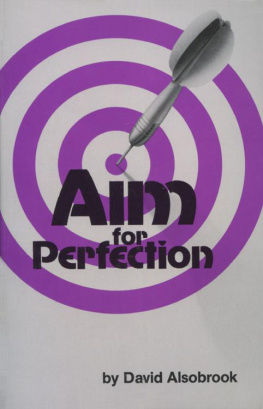David Alsobrook - No lion shall be there
Here you can read online David Alsobrook - No lion shall be there full text of the book (entire story) in english for free. Download pdf and epub, get meaning, cover and reviews about this ebook. City: Paducah, Ky, year: 1981, publisher: D. Alsobrook Evangelistic Association, genre: Religion. Description of the work, (preface) as well as reviews are available. Best literature library LitArk.com created for fans of good reading and offers a wide selection of genres:
Romance novel
Science fiction
Adventure
Detective
Science
History
Home and family
Prose
Art
Politics
Computer
Non-fiction
Religion
Business
Children
Humor
Choose a favorite category and find really read worthwhile books. Enjoy immersion in the world of imagination, feel the emotions of the characters or learn something new for yourself, make an fascinating discovery.
- Book:No lion shall be there
- Author:
- Publisher:D. Alsobrook Evangelistic Association
- Genre:
- Year:1981
- City:Paducah, Ky
- Rating:4 / 5
- Favourites:Add to favourites
- Your mark:
- 80
- 1
- 2
- 3
- 4
- 5
No lion shall be there: summary, description and annotation
We offer to read an annotation, description, summary or preface (depends on what the author of the book "No lion shall be there" wrote himself). If you haven't found the necessary information about the book — write in the comments, we will try to find it.
No lion shall be there — read online for free the complete book (whole text) full work
Below is the text of the book, divided by pages. System saving the place of the last page read, allows you to conveniently read the book "No lion shall be there" online for free, without having to search again every time where you left off. Put a bookmark, and you can go to the page where you finished reading at any time.
Font size:
Interval:
Bookmark:
NO LION SHALL BE THERE
Isaiah Chapter Thirty-Five
The wilderness and the solitary place shall be glad for them; and the desert shall rejoice, and blossom as the rose. It shall blossom abundantly, and rejoice even with joy and singing: the glory of Lebanon shall be given unto it, the excellency of Carmel and Sharon, they shall see the glory of the Lord, and the excellency of our God.
Strengthen ye the weak hands, and confirm the feeble knees. Say to them that are of a fearful heart, Be strong, fear not: behold, your God will come with vengeance, even God with a recompence; he will come and save you. Then the eyes of the blind shall be opened, and the ears of the deaf shall be unstopped.
Then shall the lame man leap as an hart, and the tongue of the dumb sing: for in the wilderness shall waters break out, and streams in the desert. And the parched ground shall become a pool, and the thirsty land springs of water: in the habitation of dragons, where each lay, shall be grass with reeds and rushes.
And an highway shall be there, and a way, and it shall be called The way of holiness; the unclean shall not pass over it; but it shall be for those: the wayfaring men, though fools, shall not err therein. No lion shall be there, nor any ravenous beast shall go up thereon, it shall not be found there; but the redeemed shall walk there: and the ransomed of the Lord shall return, and come to Zion with songs and everlasting joy upon their heads: they shall obtain joy and gladness, and sorrow and sighing shall flee away.
The Prophet Isaiah frequently tells about nature and compares it to mankind. In Chapter 35 he deals with a desert and tells of the restoration for the individual spiritual life. The first two verses are a paragraph, and verses 3 through 10 are another paragraph. Isaiah begins with a desert and finishes with a garden, or a paradise. He gives the comparison of the natural order of nature, gives the steps of how this comes into being, and then gives us the sevenfold provisions provided for us in the restoration.
The first paragraph of the chapter is given in a symbol. The "wilderness" denotes dry ground, or desert. The "solitary place" means a lonely, or waste place, not much there. That is, it is void, empty, a barren area.
"The wilderness and the solitary place shall be glad for them; and the desert shall rejoice, and blossom as the rose." The picture here is that life, "the blossoming," takes place. Isaiah prophesies that the desert, which speaks of barrenness, futility, waste, and in a sense, death, will come to life.
Where was man before death entered the world?
He was in a garden, a place that blossomed, every green herb, every fruit of every tree was present. This was not only true in the natural but was symbolic of his spiritual experience. He was fruitful. He was in a place of great fellowship with God. He enjoyed communion with his Creator.
After man's fall, God spoke to Adam concerning the ground. Up to that time it had been fruitful, but from the fall on it was to bear thorns and thistles (Gen. 3:17-18). Man, who had been in fellowship, was now estranged or separated from God. Isaiah compares this spiritual void to a desert.
In Ephesians 2:1 we read: "And you hath he quickened, who were dead in trespasses and sins." The whole human race was deaddeadened. We speak of someone who is apart from Christ as being dead, and of course, in a sense that is true. We think of one who is dead as one who is not operating. For example, a drunkard cannot keep from the bottle, but when he dies he no longer drinks, he ceases to operate, he ceases to function. You could pour whiskey all over him but that would receive no response. But the human spirit, apart from God, DOES still thirst, search and long for the lost fellowship of its Creator.
That vacuum within still hungers for God. If the human spirit were actually dead that would not be applicable. But we know that it is true that man does desire for that vacuum to be filled, so instead of saying the human spirit is dead, we should say it is DEADENED, deadened by our sin.
The human spirit before it is born again can be very much in operation. Mediums and spiritualists all operate out of their deadened spirit through the nature of Satan. Satan is "dead"cut off from life, yet he is in operation. Our spirit was DEADENED by sin. We were a desert. A desert is a deadened placeoperating under the curse and producing thorns and thistles.
In our text, God, through pictures from nature, is speaking to man (see Romans 1:20) to cause us to see that the desert itself looks like a curse: thorns, stinging needles on many plants, and full of rattlesnakes.
But notice: "The desert shall rejoice, and blossom as the rose"!
Those persons who interpret the Scripture only in the literal sense take Isaiah 35:1 as being fulfilled today because Israel annually exports 50 million roses. But, where you see the literal fulfillment (physical Israel), it will also be symbolically fulfilled in the Church (spiritual Israel, Galatians 6:16). God is going to take His very, very dry, traditional people, and cause the Church, which is His heritage, to blossom and bring forth life. That which was so dead (deadened) with no hope, will not only come to life, it will bring forth life abundantly.
"It shall blossom abundantly" (v. 2).
In verse 1 we are told the desert will blossom, but verse 2 says "...
it shall blossom abundantly." It does not say it will blossom roses.
Isaiah said it would blossom "AS the rose," which is speaking of Jesus. He is our pattern.
In the Song of Solomon, the Lord Jesus Christ is referred to as
"the rose of Sharon" (2:1). We blossom AS the Rose. We come to life in the image of Jesus Christ. We are being conformed to the image of God's dear Son. When the "Rose" walked on earth, He said, "I am come that they might have life, and that they might have it more abundantly" (John 10:10). This parallels Isaiah's statement, "It shall blossom abundantly." Life, life ABUNDANT!
Not only will the desert blossom, it will sing. Throughout the Bible whenever Israel was in captivity and bondage they did NOT sing. Take note of the encouraging words in Isaiah 35:1-2: "glad, rejoice, rejoice, joy and singing." Anywhere in the Scripture where restoration appears there is always singing.
While in Babylonian exile, Israel's worship of God was bound by their captivity, as is graphically expressed in Psalm 137: "By the rivers of Babylon, there we sat down, yea, we wept, when we remembered Zion. We hanged our harps upon the willows in the midst thereof.... they that wasted us required of us mirth, saying, Sing us one of the songs of Zion" (v. 1-3). Babylon knew all about how the Holy Rollers sang! The Israelites were asked to sing the songs of Zion, but they replied, "How can we sing the Lord's songs in a strange land?" (v. 4).
The word "Babylon" comes from the word Shinar, which means "confusion." Babylon compares to the religious system so prevalent today. When God's people are in that religious system they do not sing the Lord's song. The harps are muted by oppression. But when Israel came out of bondage what did they say? "When the Lord turned again the captivity of Zion, we were like them that dream. Then was our mouth filled with laughter, and our tongue with singing: then said they among the heathen, The Lord hath done great things for them" (Ps. 126:1-2). While in bondage they couldn't sing, but when liberated, that was the first thing they did, sing and laugh!
The prophet Jeremiah, too, reports about this. "... Again there shall be heard in this place... the voice of joy, and the voice of gladness, the voice of the bridegroom, and the voice of the bride, the voice of them that shall say, Praise the LORD of hosts: for the LORD is good; for his mercy endureth for ever: and of them that shall bring the sacrifice of praise into the house of the LORD. For I will cause to return the captivity of the land, as at the first saith the LORD" (Jer. 33:10-11).
Next pageFont size:
Interval:
Bookmark:
Similar books «No lion shall be there»
Look at similar books to No lion shall be there. We have selected literature similar in name and meaning in the hope of providing readers with more options to find new, interesting, not yet read works.
Discussion, reviews of the book No lion shall be there and just readers' own opinions. Leave your comments, write what you think about the work, its meaning or the main characters. Specify what exactly you liked and what you didn't like, and why you think so.

